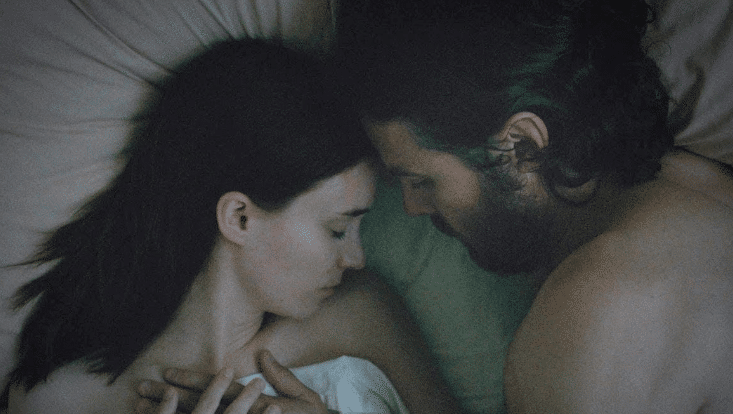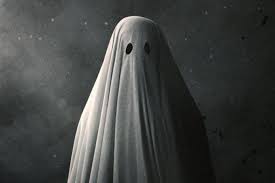 The way that I first found out about its existence no doubt did a great disservice to A Ghost Story. Remember that Guardian newspaper article from July, which argued for something called ‘post-horror’? Post-horror is, of course, simply the latest in a long line of terms invented by people who can’t quite accept that they may have liked or made some horror: we’ve had dark fantasy, social thrillers, and now we have post-horror; Nia has already debunked this more succinctly than I could do here. But the fact is, this was my first introduction to David Lowery’s film, and it could easily have poisoned the well. To anyone in a similar position, I’d say – see the film. It may be the case that it isn’t to your tastes: it’s a quiet, subtle and almost voiceless film, with minimal action and the majority of its quite devastating messages left to audience imagination. But it also manages to be one of the most horrific stories about time that I have ever seen, adding a different perspective to the old staple idea of ‘a haunting’ which has the potential to really get under your skin. It’s certainly got under mine.
The way that I first found out about its existence no doubt did a great disservice to A Ghost Story. Remember that Guardian newspaper article from July, which argued for something called ‘post-horror’? Post-horror is, of course, simply the latest in a long line of terms invented by people who can’t quite accept that they may have liked or made some horror: we’ve had dark fantasy, social thrillers, and now we have post-horror; Nia has already debunked this more succinctly than I could do here. But the fact is, this was my first introduction to David Lowery’s film, and it could easily have poisoned the well. To anyone in a similar position, I’d say – see the film. It may be the case that it isn’t to your tastes: it’s a quiet, subtle and almost voiceless film, with minimal action and the majority of its quite devastating messages left to audience imagination. But it also manages to be one of the most horrific stories about time that I have ever seen, adding a different perspective to the old staple idea of ‘a haunting’ which has the potential to really get under your skin. It’s certainly got under mine.
The nameless couple at the heart of the story (played by Casey Affleck and Rooney Mara) seem to be deeply in love – we start by seeing them cuddled intimately and sharing stories, with ‘M’ (Mara) describing how, as a child, she moved around a lot and would always write and hide small pieces of paper bearing messages – so that she left a little of herself wherever she’d been. Moving forward, the couple now seem to be planning a move of their own, away from the small house which will go on to figure hugely in the film. M seems more engaged by all of this than her partner, ‘C’, but in the rapid-fire way which is a hallmark of this film, we move forward again: C has been killed in an accident, right outside the house. His partner has to identify his body, which she does, in an understated but moving scene. All of this is traumatic in its own right; she pulls the sheet back over his face, and leaves his body behind.
 At this point, C sits bolt upright. The sheet which covers him stays in place, referencing the old idea of ghosts wearing shrouds (see the alleged ghost photograph taken at Newby Church in the UK as an example) and also the prevalent idea in Western culture that ghosts remain because of some sort of unfinished business. Instead of walking through what looks like an exit, which is incidentally the only slightest nod to conventional ideas about the afterlife in the film, he walks home. From now, the character is mute and invisible. Whereas in a book like The Lovely Bones, where the deceased narrator is again drawn back towards their loved ones, in the novel we have just that – a narrator. Here. we have to read the ghost’s actions, even gestures, and we can do no more. We do know, however, that C’s ghost is fascinated by M, and desperate to reach out to her. Here. it could easily have segued into something which feels familiar – a Ghost (1990) for the Tumblr generation, where things seem bleaker but more picturesque as a rule. However, the key moment comes when M moves out; the ghost remains, trapped, waiting for her. Weeks – or years, decades? – go by. He observes life unfolding, but it is intermittent; a moment gives way to a different season, different residents. Still the ghost is there, (usually) invisible and unable to voice his thoughts. In this, A Ghost Story is indeed a horror story, because there can be few things more horrifying than the prospect of an eternity in this state.
At this point, C sits bolt upright. The sheet which covers him stays in place, referencing the old idea of ghosts wearing shrouds (see the alleged ghost photograph taken at Newby Church in the UK as an example) and also the prevalent idea in Western culture that ghosts remain because of some sort of unfinished business. Instead of walking through what looks like an exit, which is incidentally the only slightest nod to conventional ideas about the afterlife in the film, he walks home. From now, the character is mute and invisible. Whereas in a book like The Lovely Bones, where the deceased narrator is again drawn back towards their loved ones, in the novel we have just that – a narrator. Here. we have to read the ghost’s actions, even gestures, and we can do no more. We do know, however, that C’s ghost is fascinated by M, and desperate to reach out to her. Here. it could easily have segued into something which feels familiar – a Ghost (1990) for the Tumblr generation, where things seem bleaker but more picturesque as a rule. However, the key moment comes when M moves out; the ghost remains, trapped, waiting for her. Weeks – or years, decades? – go by. He observes life unfolding, but it is intermittent; a moment gives way to a different season, different residents. Still the ghost is there, (usually) invisible and unable to voice his thoughts. In this, A Ghost Story is indeed a horror story, because there can be few things more horrifying than the prospect of an eternity in this state.
And it’s time – not any evident God or other force – which drives the quiet horror of the film. C’s ghost is fixated on achieving something in the house, but seems to forget, or time runs away from him, or he begins to observe things around him, which are distracting. The mundane holds sway, he observes day upon day upon day of it, yet he seemingly lacks the ability to focus on things of his choosing. We accompany him in this confused, unsettlingly non-linear state, allowed to tune in only at certain moments; the effect of this is very eerie, almost unpalatable. Things which we see or hear only underline the great powerlessness of this key, yet unspeaking, faceless being, and by proxy, us (though a particularly overt nihilistic speech takes a moment to hammer that powerlessness home). And time is huge – it can wipe everything away, or do worse. The film forces us to contemplate how time is doing the very same thing to us, with some key scenes in particular showing just how tenuous it all is, and how the mundane can easily shift to something cataclysmic. It’s all presented in such picturesque fashion, too, that this only underlines the deep sadness here.
A Ghost Story presents age-old concerns and truisms in an artistic, innovative and finely-detailed form. It takes away many of the markers audiences might be expecting, but in so doing, it casts us adrift in the same settings and states as C, which allows the film to cast a very sombre spell. As I said earlier in the review, its low-pitched approach will be too quiet for some (I heard someone bemoaning this as the credits rolled) but after expecting something rather smug, something deliberately ‘post-horror’, instead I found a film which is imaginative, sophisticated and incredibly affecting. It’s rare – rarer than I’d like – that I see a film which I keep returning to in my head, days after the fact: A Ghost Story definitively achieves this, with next to no dialogue and only little exposition. Sometimes that which speaks least speaks the loudest, and there are no easy answers to be had.
A Ghost Story is now showing in selected UK cinemas.
